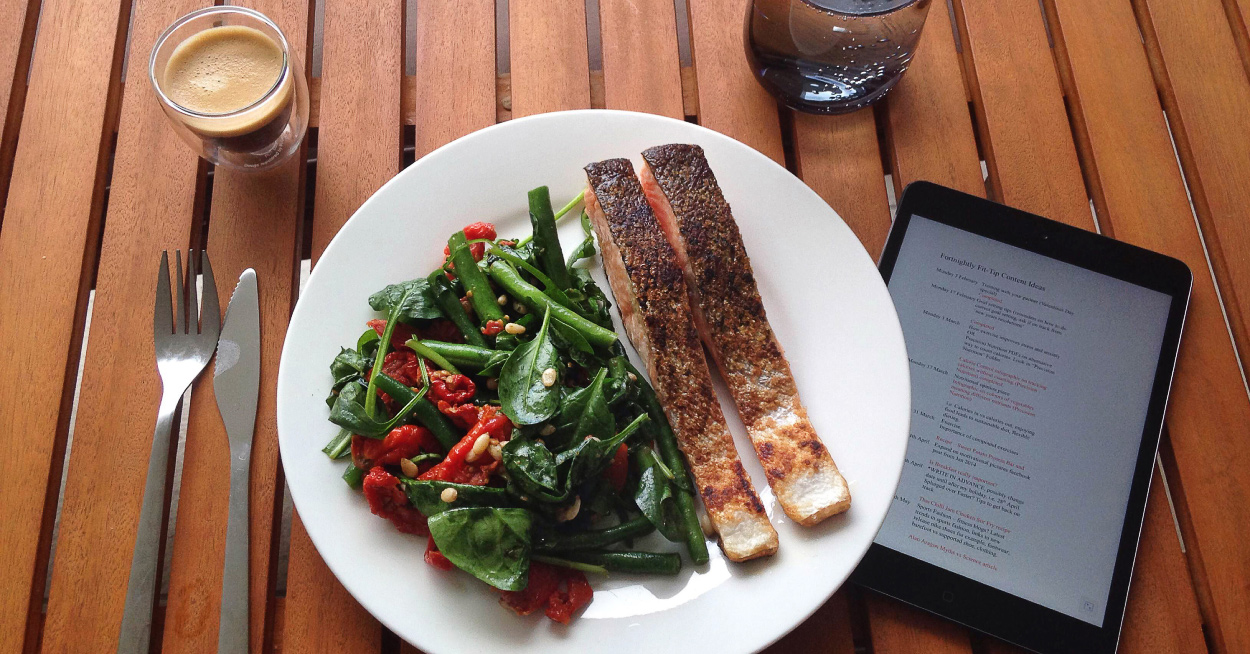4 simple habits to master for improved calorie control
Improving your health requires changes that are sustainable for the long term. As a Precision Nutrition coach, we often provide guidance to our clients that are interested in fat loss on how to master certain food habits which will naturally lead to improved calorie control and food selection. These habits are:
1. Eat slowly and stop at 80% full
Most people (including myself) can often tend to eat their meals far too quickly, which lessens our ability to feel our hunger and appetite cues. Did you know it takes 20 minutes for our satiety mechanisms to kick in? The communication between our stomach and our brain is slow, and because of this, if we eat quickly we are far more likely to eat too much before our brain notifies us that we’re content. An excellent goal would be to aim to spend 15-20 minutes each meal. I realise this may be difficult for some so slowing down by even a few minutes will still have it’s benefits. This way, you will be able to properly gauge your fullness, which will enable you to eat until you’re ‘80% full’ which is defined as eating until you are no longer hungry, rather than eating until you’re full. This may take some practice but overall will be beneficial for your digestion, performance during your exercise, and better sleep if you’re eating before bed.
2. Eat protein dense foods with each meal
Research has shown that not only is a diet higher in protein completely safe, it may actually be important for achieving the best health, body composition (body fat % and muscle mass), and performance. The fact of the matter is, it’s hard to achieve these things with a suboptimal protein intake. By incorporating decent amounts of protein (20-30g for women, 40-60g for men) per meal, you will not only ensure you consume an adequate amount of protein, but you’ll also stimulate your metabolism, improve your muscle mass and recovery, and reduce body fat.
3. Eat vegetables with each meal
Science has demonstrated that in addition to the fibre and micronutrients (vitamins and minerals) packed into vegetables, there are also important plant chemicals called phytochemicals which are essential for optimal functioning inside our bodies. Unfortunately an inadequate vegetable intake is something I see all too often, which was reflected in Australia’s new food pyramid released earlier this year which placed vegetables (as well as fruit and legumes) as the food group we should consume the most. Given only an estimated 7% of all Australians reach their recommended intake of vegetables per day, it is something we should all aim to improve on. Including two servings of vegetables/and or fruit during each meal, not only will you regulate your overall food intake but you will also be receiving the many disease fighting benefits that vegetables provide.
4. Eat healthy fats daily
As a general rule of thumb, about 30% of your diet should come from fat, although this can change between each individual. Whilst you should focus on adding monounsaturated (extra virgin olive oil, some nuts, avocados, red meats, eggs) and polyunsaturated (some nuts, some vegetable oils, fish/fish oil) fats, including some saturated fats is ok too as a balance of all 3 types of fat is optimal. The benefits of dietary fat include the balancing of hormones, increased brain and nervous system health, and improved metabolism.
Mastering these four habits are simple and sustainable ways to improve your overall health, body composition, and performance, as your calorie control and food selection will be greatly improved.


